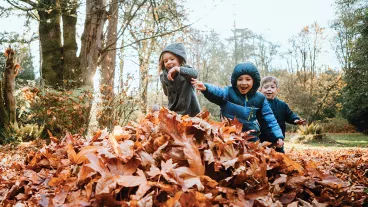Parents encouraged to give children more freedom when playing in nature
November 2023
Download Media release
Parents are encouraged to pause and follow their child’s lead when playing in nature, helping them experiment and assess risk for themselves, in a new evidence-based practice guide developed by the Australian Institute of Family Studies (AIFS).
Other recommendations include limiting cautionary language whenever possible, such as ‘be careful’, ‘not so high’ and ‘don’t do that’.
Research Fellow at AIFS, Dr Jasmine B. MacDonald, said allowing children to push the boundaries during riskier types of play can help them develop confidence and awareness of their own limitations.
“We wouldn’t advise leaving children in highly risky situations – but sometimes it can be better to stand back and let the child work out their own levels of comfort,” Dr MacDonald said.
“It can also be helpful to reassure children that it’s okay to try and fail with new or tricky activities, which can help them understand their own limits and capabilities.”
Based on Australian and international research, the guide is designed to help parents and practitioners working in the family and child sector support children to interact with natural elements – including trees, plants, rocks and dirt.
Dr MacDonald said natural spaces don’t have to be large or remote, meaning children living in high-density urban areas can also play in nature.
“Most outdoor spaces can be suitable for nature play, including backyards, courtyards, balconies and local parks – or even just walking around the block paying attention to trees, plants or the weather,” Dr MacDonald said.
“Children can count insects, birds and flowers, balance on logs or rocks, or make shapes, letters or objects with loose items, like sticks, leaves or stones. Planting, digging, making things or exploring are all beneficial for early childhood development.”
The guide also explores factors that impact the likelihood of young children engaging in nature play – including a child’s willingness to ‘get dirty’, parents’ assessment of their child’s capabilities and parents’ health and safety concerns.
Dr MacDonald said although some parents may have legitimate concerns about children playing in nature, it’s always worth considering the bigger picture.
“Nature play has many benefits for young children, including fostering creativity, curiosity and imagination, as well as physical challenge and development,” said Dr MacDonald.
“Parents can sometimes underestimate their child’s abilities or be influenced by other adults when it comes to riskier types of play – but, with the right support, playing in nature can do wonders for autonomy and confidence,” Dr MacDonald said.
Access the practice guide: Engaging young children (0-5 years) in nature play.
News stories
Media contact
Kate O'Connor
Phone: 0499 860 257
Email: kate.o'[email protected]
